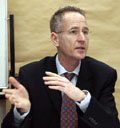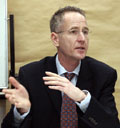
Interview with Thorsten Karg:German media trainers in Yemen [Archives:2005/821/Community]
March 3 2005
 |
A German press delegation has visited Yemen recently from the Deutsche Welle in Bonn who conducted a training course on current affairs news in Sana'a. The Yemen Times met with Thorsten Karg who shed light on the objectives of this workshop and different issues in the following intereview.
Q: What is the purpose of your visit to Yemen?
A: My two colleagues and I are in Yemen for two weeks conducting a workshop for Yemeni radio journalists. This workshop was jointly organized by MCTQI and the Deutsche Welle Radio Training Center (DW-RTC). It is the first time that the two organizations have cooperated in organizing a journalistic workshop in Yemen. But depending on the outcome, it will hopefully not be the last.
In the past numerous Yemeni journalists have already taken part in DW-RTC workshops. But these workshops usually took place in other Arab countries or in Germany. Some of these workshops were on radio management, others were on radio technology, and others dealt with journalistic aspects. But this workshop-taking place now in Sana'a is the first one exclusively for Yemeni radio journalists.
Q: What is the objective of the workshop?
A: The title of this workshop is “News and Current Affairs”. During the two weeks of the workshop, we've been discussing numerous journalistic formats with the 13 participants. For instance, we discussed how to write news so that the listeners can easily understand them. We practiced doing interviews that will be interesting and informative for the audience. And we dealt with writing commentaries on controversial issues, which can confront the audience with new lines of thinking and show pluralism in society.
All of these formats contribute to creating an informed public – something that is vital in any democratic society. In our philosophy, it is the main task of radio journalists to present unbiased and objective information to their listeners. That way, the listeners can build their own opinions about what is going on around them and in the world.
As you can see, this is an ethical question of what journalism is or what it should be. And such ethical questions are also an integral part of this workshop. We come back to them in every discussion that we have with our participants. We keep dealing with questions like: How can we serve our audience? How can we increase knowledge? How can we create understanding? And: what is the difference between propaganda and information?
Aside from improving journalistic skills and discussing ethical questions related to journalism, there is a third aspect of this workshop that is very important: radio technology. We have brought some of the latest audio editing software, recording devices and computers from Germany for this workshop. We are training the 13 participants on how to use these gadgets, which will surely also be used by Yemeni radio stations before long. And what I hear from our participants, they enjoy this technical training very much.
There's one more thing that is important to me concerning this workshop: we are not lecturing the participants, but most of the workshop is based on discussions. All of the participants already work as radio journalists – so they all have a wealth of experience that they can share amongst each other and with us. So you see: they are also learning from each other and we are also learning from them.
Q: How do you assess the participants?
A: My two colleagues and I very much enjoy working with the participants. We find them extremely active, eager to learn and to discuss. Sometimes the discussions get so heated that it is difficult for us to follow what is being said. But that is good. It shows that everyone is in it with their hearts.
If you ask me whether they need more training, I can only say that everyone always needs to keep on learning – including you and me. No one should ever say he or she does not need any additional training. As I said: the participants in this workshop are very eager to learn more – so that makes me happy as a media trainer.
I think most of the participants in our workshop enjoyed the interview training that we did very much. Not all of them had done interviews before. It seems to me that it is not that common in Yemen's radio stations for journalists to go out and do interviews. Asking tough but fair questions that address the issues that the listeners are interested in, seemed to be new for some of our participants.
Q: How do you find the landscape of Yemen?
A: Since we have been working most of the time that we've been in Yemen, we haven't really had a chance to see much of the country. The only thing we've seen is the old city of Sana'a, which we found spectacular. It reminded us of the tales of 1001 nights. For us, who come from Europe, Yemen is very exotic: all the sights and smells, the food, which is foreign to us and the different customs and traditions.
What we've really enjoyed so far is the warmth and the hospitality of the Yemeni people. It's really amazing how warmly we are greeted everywhere. People on the street always ask us “where are you from?” and when we say ” from Germany”, they always smile and give us the thumbs up sign.
After our workshop ends, we're planning to go to Hadramout for three days and I am very much looking forward to that.
Q: What is effect of the global media on poorer countries?
A: In these days of globalization, the world seems to be getting smaller every day. A few decades or centuries ago, people didn't have to worry or care about what was happening outside their village, their country, their region. But today, everything and everyone is inter-connected. Our economies are intertwined. Ecological disasters don't stop at countries borders, they affect us all. So we can no longer sit back in our little villages and say: I don't want to know what is happening in the rest of the world.
This is where the media come in: it is the job of journalists and of the media to explain what's going on in the world to their audiences. People have to know – because it affects them. For example, if a wide-ranging decision is taken in Washington, it can have immediate effects on Arab countries. And if oil – producing Arab countries decide to reduce the amount of oil they sell on the world market, this in turn will have an immediate effect on the economies of Europe, America and Asia. So you see, there is a lot that eh media have to report and explain to their publics. And this means the ” global players” among the media, like the BBC in Britain, Deutsche Welle in Germany and CNN in the US, as well as the media in countries like Yemen. And I am hoping that in the future, there will be more cooperation among these media so that we can all learn how to live together peacefully in this world.
Q: Any last comments?
A: We would like to thank the people at MCTQI for being so patient with us and for doing such a good job with regard to co-organizing this workshop. And we'd like to express our thanks to the Yemeni people for welcoming us with open arms. We will go home with very fond memories of this country and its people.
——
[archive-e:821-v:13-y:2005-d:2005-03-03-p:community]


